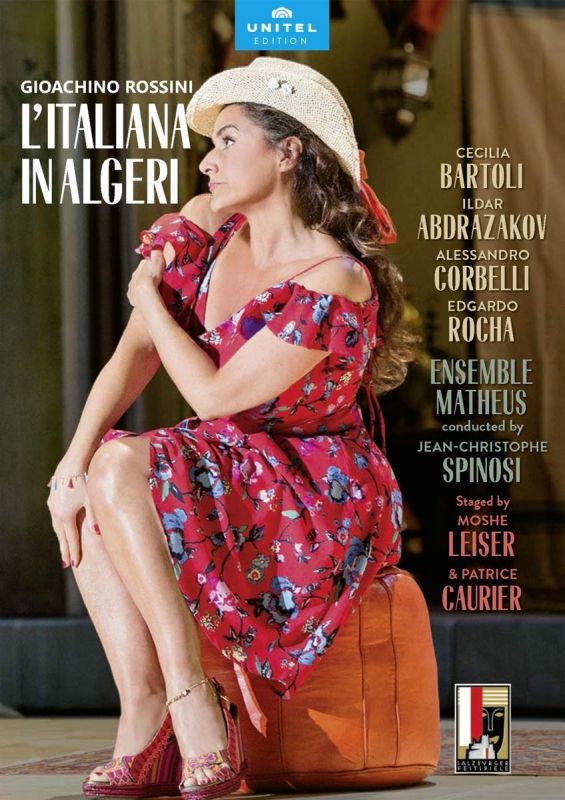ROSSINI L’italiana in Algeri (Spinosi)
View record and artist detailsRecord and Artist Details
Composer or Director: Gioachino Rossini
Genre:
Opera
Label: C Major
Magazine Review Date: AW2019
Media Format: Digital Versatile Disc
Media Runtime: 163
Mastering:
DDD
Catalogue Number: 801 808

Tracks:
| Composition | Artist Credit |
|---|---|
| (L')Italiana in Algeri, '(The) Italian Girl in Algiers' |
Gioachino Rossini, Composer
Alessandro Corbelli, Taddeo, Baritone Cecilia Bartoli, Isabella, Mezzo soprano Edgardo Rocha, Lindoro, Tenor Ensemble Matheus Gioachino Rossini, Composer Ildar Abdrazakov, Mustafa, Bass Jean-Christophe Spinosi José Coca Loza, Haly, Bass Philharmonia Chorus Rebeca Olvera, Elvira, Soprano Rosa Bove, Zulma, Mezzo soprano |
Author: Richard Osborne
If this was, indeed, Bartoli’s first Isabella, it was worth the wait. When she arrived as a Rossini ingénue in the late 1980s, she was an indifferent actress. No longer. Nowadays she’s a consummate comédienne whose work looks especially well on film. As for her singing, one would be hard-pressed to find a better-sung Isabella or one in which the role’s bespoke ornamentation was more closely aligned to gesture and look. ‘Per lui che adoro’ is a particular delight, as is ‘Pensa all patria’, cleverly staged as a ‘lie back and think of Italy’ number, as Isabella and her lover taunt her hapless suitors.
As for Bartoli the impresario, she’s treated herself to an A list cast. Go back to recordings in the late 1970s and you will hear the role of Mustafà, the bully-boy Bey with an insatiable sexual appetite and a low boredom threshold, being sung either by an unkempt bass or (incorrectly) by a buffo. Salzburg’s Ildar Abdrazakov is a thoroughly schooled bass who shows deftness of touch in passages of quick-fire coloratura while being entirely at ease with the role’s full declamatory range from low B flat to high G. Quite how he brings this off, given some of the postures he’s required to assume by the producers, will forever remain a mystery.
He is not a pretty sight appearing, like a pot-bellied Mike Tyson, dressed in his underwear but that, presumably, is the producers’ point. I’ll probably not be revisiting the bedroom scene which plays out during the overture as his odalisque tries to interest him in some early-morning rumpy-pumpy. (Rebeca Olvera gives a performance in the Julie Walters class of the excruciatingly unattractive Elvira.)
The producers have updated the action to modern Algiers, with containers and later a luxury yacht glimpsed through Mustafà’s penthouse window. Meanwhile, the pimping goes on in a back-street tenement festooned with satellite dishes, as Mustafà’s henchman Haly tries to kidnap Italian totty for his master. Haly is engagingly played by José Coca Loza, who duly gets his Act 2 aria about the women of Italy. This he sings while watching Anita Ekberg in the Trevi Fountain scene from Fellini’s La dolce vita on the penthouse video.
Leiser and Caurier’s ability to turn a stereotypical early 19th-century buffo libretto into gilt-edged comedy resembles that of the late Jean-Pierre Ponnelle. Which is convenient, because L’italiana was the one Rossini opera Ponnelle never really got right. Rossini himself had already transformed the libretto (originally set by the composer Luigi Mosca) with such comic gems as the duet ‘Ai capricci’ between Isabella and her middle-aged admirer Taddeo. The duet (written in ripped-off sonata form) is a locus classicus of comic writing and is doubly so, as here, when the direction and the acting are linked symbiotically to the music.
The Taddeo is Alessandro Corbelli, who has been playing the role more or less to perfection for as long as I can remember – certainly back to Covent Garden in the late 1980s. He’s now in his mid-60s and perfectly matched to Bartoli’s Isabella, the ‘older women’ whose lost love Lindoro is played as the kind of burly hunk of rough this relatively mature, no-airs-and-graces Isabella might well have fallen for. The Uruguayan tenor Edgardo Rocha both looks the part and sings superbly.
The ensembles – the Act 2 Kaimakan sneezing quintet and Pappataci trio, in particular – are beautifully done, never guyed or overplayed, with every jot and tittle of comic byplay again meticulously tied to the music by Leiser and Caurier. The moment in Act 1 where Isabella recognises Lindoro, a scene Mozart might have been proud to own, is deftly done – deftness being the defining characteristic of the light-touch Ensemble Matheus and its conductor Jean-Christophe Spinosi.
I’m not sure about the Act 1 finale, the greatest of all Rossini’s realisations of his vision of humankind descending into a vortex of its own making. There’s an old saying: never act with children or animals – or, in this instance, with wheeled furniture. Still, no one breaks their neck (tell Health and Safety). So all’s well that ends well in a production of this much-revived opera that’s as good as any of us is ever likely to see.
Discover the world's largest classical music catalogue with Presto Music.

Gramophone Digital Club
- Digital Edition
- Digital Archive
- Reviews Database
- Full website access
From £8.75 / month
Subscribe
Gramophone Full Club
- Print Edition
- Digital Edition
- Digital Archive
- Reviews Database
- Full website access
From £11.00 / month
Subscribe
If you are a library, university or other organisation that would be interested in an institutional subscription to Gramophone please click here for further information.




